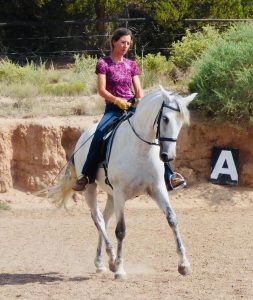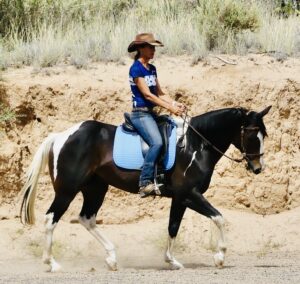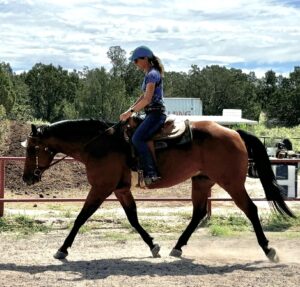Editor’s Note: Katrin was born and raised riding dressage in Germany, but moved to New Mexico in 1990 to become a cowgirl. Since then, she has found a lot of common ground between English and Western riding and excels with this holistic knowledge. Check out her website.

Katrin Silva
Today, she feels equally at home in saddles with and without horns. She believes every horse, regardless of breed, age, or background, can benefit from a well-rounded education that incorporates elements of both traditions. Katrin is a regular guest columnist for Cayuse Communications and the author of two books.
By Katrin Silva
Sometimes, the most important lessons horses teach us happen at the most unlikely points in our lives.
For me, the path to lightness came at a dark time. I have always been athletic and physically strong, so my first bout with serious illness at the age of 53 plunged me into complete despair. I felt sicker and sadder than I ever had in my life. Still, I dragged myself to the barn every day, and onto a trustworthy horse or two. This may not have been the smartest thing to do, but I desperately needed to hang on to a sliver of what had always brought me joy.
At first, I was not able to do much in the saddle, other than wander around, feeling the comforting, familiar rhythm of a big, swingy walk underneath me. Once I was still weak but no longer dizzy, I was able to trot and canter, though I took more walk breaks than ever before and sometimes had to stop and gasp for air.
 During those forced walk breaks, I tried to think less about the fit, strong rider I had been, and more about the things I could still control: my body position, the giving back of every half halt, a neutral, following seat. My active aids were brief because they had to be. My muscles could not push the horse in any particular direction. They could only suggest, and then quit suggesting. Rather than practicing something over and over, I could repeat an exercise once, maybe twice, before I ran out of steam and had to take another break. I was surprised when the horses, far from tuning me out, tuned in to me instead.
During those forced walk breaks, I tried to think less about the fit, strong rider I had been, and more about the things I could still control: my body position, the giving back of every half halt, a neutral, following seat. My active aids were brief because they had to be. My muscles could not push the horse in any particular direction. They could only suggest, and then quit suggesting. Rather than practicing something over and over, I could repeat an exercise once, maybe twice, before I ran out of steam and had to take another break. I was surprised when the horses, far from tuning me out, tuned in to me instead.
At that point, I realized something profound: my body operated on almost zero strength, but most of the time, the horses seemed happy to do what I was asking. In spite of my reduced physical state, the horses listened to me more, not less. In return, I spent more time listening to them and less time beating myself up for not riding perfectly.
I let go of all competitive goals. I was happy to just be on a horse. Nothing else mattered.
 Instead of judging the quality of the movement or the quality of my riding, I just breathed (which, to be fair, required a lot of my attention). Instead of mentally checking boxes of all the things I was supposed to be doing, I was thinking less. When I did think, it was about how to ask for the next movement or transition in the most tactful, most appropriate way.
Instead of judging the quality of the movement or the quality of my riding, I just breathed (which, to be fair, required a lot of my attention). Instead of mentally checking boxes of all the things I was supposed to be doing, I was thinking less. When I did think, it was about how to ask for the next movement or transition in the most tactful, most appropriate way.
Like so many other riders, I’ve pursued the goal of lightness all my life. For the past few years, I thought I understood the concept, in theory, at least. I first started searching for lightness while growing up in Germany, where the ideal I read about in books about dressage did not compare to what the heavy, dull horses in my riding school felt like. I moved halfway around the world, and I looked for it in in Western and English saddles, in groomed competition arenas and dusty round pens. I compared the German dressage theory to French and Portuguese versions. I devoured every shred of information about it until I thought I knew what it was. But I didn’t, not really.
Lightness does not start with the horse capitulating in the face of strong aids. Lightness starts with light aids. I knew this as a principle. I believed in it. I just did not know just how light my aids could be until stronger aids were impossible to give. Lightness means getting out of the horse’s way at the soonest possible moment and giving him the chance to do his job. I never fully realized how important this is until my body forced me to.
Once the crutch of muscle strength was no longer available, I became aware of how little I needed it to begin with. I’m glad I feel healthy again, but I also feel grateful for this lightbulb moment. I hope the lightbulb stays on. I’ve regained some of my former fitness by now, but, when I’m riding, I still find myself pretending I’m weak. The horses like me better that way.